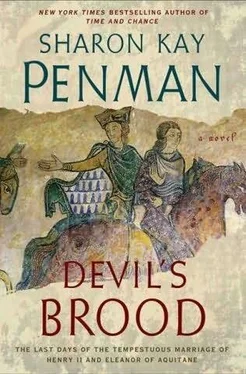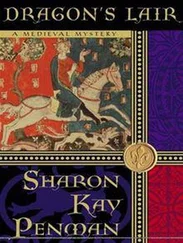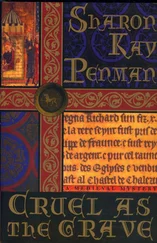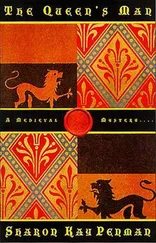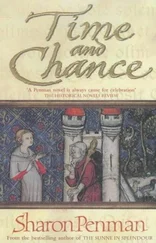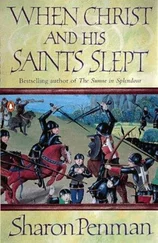Sharon Penman - Devil's brood
Здесь есть возможность читать онлайн «Sharon Penman - Devil's brood» весь текст электронной книги совершенно бесплатно (целиком полную версию без сокращений). В некоторых случаях можно слушать аудио, скачать через торрент в формате fb2 и присутствует краткое содержание. Жанр: Исторические приключения, на английском языке. Описание произведения, (предисловие) а так же отзывы посетителей доступны на портале библиотеки ЛибКат.
- Название:Devil's brood
- Автор:
- Жанр:
- Год:неизвестен
- ISBN:нет данных
- Рейтинг книги:4 / 5. Голосов: 1
-
Избранное:Добавить в избранное
- Отзывы:
-
Ваша оценка:
- 80
- 1
- 2
- 3
- 4
- 5
Devil's brood: краткое содержание, описание и аннотация
Предлагаем к чтению аннотацию, описание, краткое содержание или предисловие (зависит от того, что написал сам автор книги «Devil's brood»). Если вы не нашли необходимую информацию о книге — напишите в комментариях, мы постараемся отыскать её.
Devil's brood — читать онлайн бесплатно полную книгу (весь текст) целиком
Ниже представлен текст книги, разбитый по страницам. Система сохранения места последней прочитанной страницы, позволяет с удобством читать онлайн бесплатно книгу «Devil's brood», без необходимости каждый раз заново искать на чём Вы остановились. Поставьте закладку, и сможете в любой момент перейти на страницу, на которой закончили чтение.
Интервал:
Закладка:
Bishop Richard wasted no time in breaking the bad news. “I fear your journey has been for naught, my lord bishop,” he declared dolefully, his sorrowful visage almost but not quite disguising the relish that people invariably take in being the bearer of evil tidings. “The king met this afternoon with the Holy Father’s legates, but it did not go well. King Henry balked at renouncing his Constitutions of Clarendon, and when no progress could be made on this contentious issue, he stalked out in a rage, saying he had matters to tend to back in Ireland.”
By now others had gathered around them. Roger recognized the abbot of Savigny, utterly dismayed that this disaster should occur on his watch. He was flanked by the equally flustered Bishops of Bayeux, Sees, and Le Mans, theirs the doomed expressions of men trapped between Scylla and Charybdis, owing their allegiance to Henry, and their obedience to Pope Alexander. Bishop William of Le Mans felt a flicker of hope, though, with Roger’s arrival, and at once entreated him to seek out his cousin the king.
“His Grace will heed you, my lord, for he has great respect for your good judgment. Surely you can convince him of the folly of abandoning the talks with the Holy Father’s legates?”
Roger was past the first flush of youth, and a day in the saddle had taken its toll; his back ached and his muscles were sore and cramped. He’d been looking forward to a bath and a nap before he changed his travel-stained clothing and presented himself to the cardinals and the king. Suppressing a sigh, he looked at the circle of expectant faces and agreed to do all in his power to keep his cousin from returning to Ireland.
Savigny’s abbot had turned his own quarters over to his royal guest, and Abbot Robert offered to show Roger the way. Observing the older man’s sedate pace and calm demeanor, Roger realized that he did not seem nearly as disquieted as the bishops. “I’d almost forgotten,” he said, “how well you know the king,” and Abbot Robert’s mouth hinted at a smile.
“I know this much,” he said amiably. “The king does not like to make war. But when he does, he does it very well, and sometimes the wisest tactic is a strategic withdrawal.”
“Indeed,” Roger agreed, and they entered the abbot’s great hall, overflowing with the king’s servants, household knights, barons, and clerics. Roger was running the gauntlet of greetings, had just reached the Bishop of Evreux, when the bedchamber door opened and Henry strode into the hall.
As usual, he did nothing to call attention to himself and his clothing would have been remarkably plain and unadorned for a minor border lord, much less the man who ruled the greatest empire since Charlemagne. But Henry had no interest in the trappings of power, only in the exercise of it. Nor did he need to strut and preen as Roger had seen other men of rank do, as Thomas Becket had done during his years as the king’s elegant, worldly chancellor. Yet Henry was always the focus of all eyes, even upon those rare occasions when his identity was not known. Even as a youth, he’d had it, the force that gave him the mastery of other men. It was as if he were a lodestone, a magnet that attracted light and luck, not metal.
That was so fanciful a thought that Roger laughed softly to himself as he moved toward his cousin the king. Henry was delighted to see him, reaching out to clasp Roger’s hand in both of his, forestalling a formal obeisance. “At last! I’d begun to fear you’d been waylaid by bandits or Breton demons!” Adding with a gleam of mischief, “Not that one so virtuous and worthy would have anything to fear from the forces of darkness. What evil spirit would dare to defy a bishop?”
“Your Grace’s faith in my sanctity is most heartening,” Roger said dryly, “given that some claim your lineage can be traced to the Devil.”
Henry’s grey eyes flashed, but with amusement, not anger. “Ah, yes, the righteous Abbot Bernard once declared that my lord father was the Devil’s spawn, or words to that effect. As I recall, my father laughed at him, much to the sainted Bernard’s indignation.”
Roger knew that story well; it was legendary in their family. The man Henry sardonically called “the sainted Bernard” was likely to become a genuine saint, as the Holy See had begun the canonization process. But impending sainthood had not tempered Henry’s disdain, for Abbot Bernard had been a bitter enemy of the counts of Anjou, claiming that the Angevins sprang from a depraved stock, doomed and damned. Roger did not doubt that Abbot Bernard was a holy man, blessed by the Hand of the Almighty, but neither did he deny that Bernard’s earthly behavior had not always been saintly. God’s Lambs were not always meek, mild, and forgiving, and for a moment, he thought sadly of his friend and martyr, Thomas Becket.
Shaking off the memory, he reminded himself that today’s needs must take precedence over yesterday’s regrets. Meeting Henry’s gaze evenly, he said, “I hear, my lord king, that you’ve a sudden yearning to see the Irish isle again.”
Henry’s expression was not easy to read, for he had the irritating ability to appear utterly inscrutable when it served his purposes. “Yes,” he said, “you’ve heard right. Come on in,” jerking his head toward the open bedchamber door, “and I’ll tell you of my travel plans.”
Several men were gathered in the bedchamber, only one of whom Roger was pleased to see, his uncle Rainald, Earl of Cornwell. The others-Arnulf, Bishop of Lieieux, Geoffrey Ridel, Henry’s acting chancellor, and Richard of Ilchester, Archdeacon of Poitiers-were trusted royal councilors, but they had also been avowed enemies of Thomas Becket. Fending off his uncle’s bear hug of a greeting, Roger acknowledged the bishop and archdeacons with cool civility, and then turned to face Henry.
“You are not truly ending the talks ere they begin, Harry?”
“Of course not.” Henry accepted a wine cup from Rainald, gesturing for Roger to help himself. “On the morrow, Arnulf will seek out the legates and offer to mediate our differences.”
“And what are those differences?”
“They demanded that I repudiate the Constitutions of Clarendon.” Henry’s smile was without humor. “And you know how likely I am to agree to that, Cousin.”
Roger did. Henry had attempted to define and clarify the ancient customs of the realm by putting them down in writing, a radical proposal to his conservative bishops, who had been accustomed to vague, ambiguous terms that could be accepted or repudiated as circumstances warranted. But they were practical men for the most part, well aware that there must be accommodation between Church and Crown; if the king refused to unsheathe his secular sword to enforce spiritual penalties, how effective would those penalties be?
Compromise was anathema, though, to the Archbishop of Canterbury. Thomas Becket had refused to accept the Constitutions in any form whatsoever, arguing that the Church, not the king, was the giver of laws. But Henry had forced the issue, for accommodation was possible only if there was trust on both sides, and Henry no longer believed he could trust his former friend and chancellor. Becket had eventually given in and ordered the bishops to accept the Constitutions, only then to repent and recant his sworn oath. Within less than a year, Becket had fled into French exile, and the Pope, reluctantly dragged into this dangerous dispute, had backed Becket’s position and came out in opposition to the Constitutions of Clarendon. The stalemate had endured for the remainder of Becket’s life, looming ahead of them now like an uncharted rock, threatening to sink all hopes of a peaceful settlement.
That would not happen, though, as long as Roger drew breath. He was going to steer this ship into a safe harbor if it was the last thing he ever did. “When I was in Rome last year to plead your case at the Holy See, I spoke at some length with several of the cardinals. I gathered that the Church’s objections to the Constitutions were not so much based upon the contents; they accepted your argument that the customs set down were indeed the traditional practices of the realm, more or less. Their concerns were with the oaths that you demanded of all the bishops. Never had such oaths been required by any of your predecessors. We balked at taking vows that might conflict with canon law, as you well remember, Harry. It was only when Thomas’s resolve briefly weakened, that we had to agree-”
Читать дальшеИнтервал:
Закладка:
Похожие книги на «Devil's brood»
Представляем Вашему вниманию похожие книги на «Devil's brood» списком для выбора. Мы отобрали схожую по названию и смыслу литературу в надежде предоставить читателям больше вариантов отыскать новые, интересные, ещё непрочитанные произведения.
Обсуждение, отзывы о книге «Devil's brood» и просто собственные мнения читателей. Оставьте ваши комментарии, напишите, что Вы думаете о произведении, его смысле или главных героях. Укажите что конкретно понравилось, а что нет, и почему Вы так считаете.
